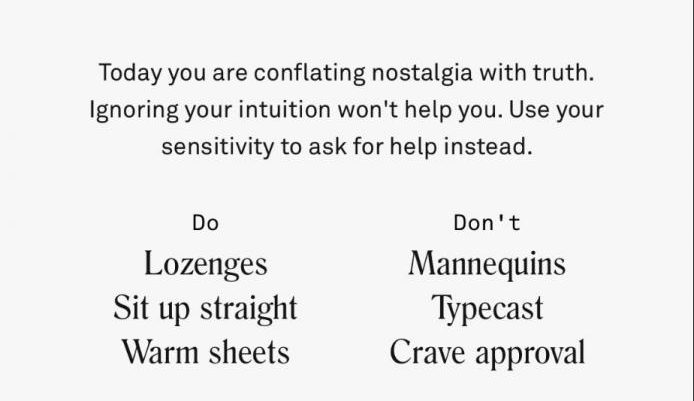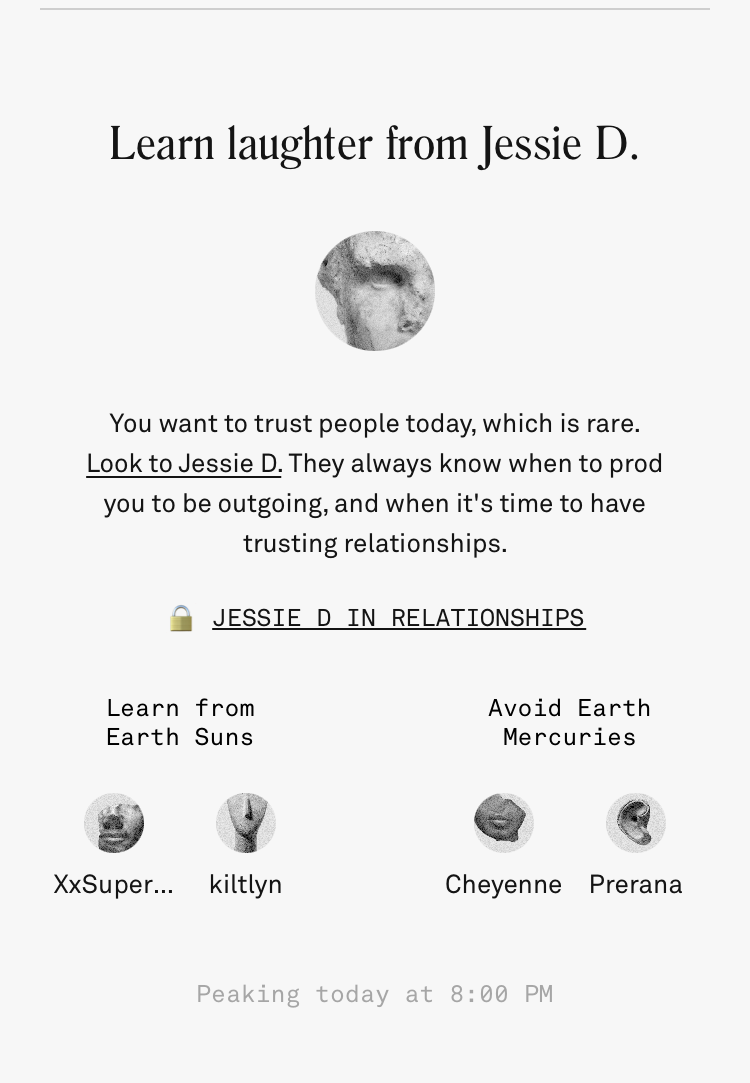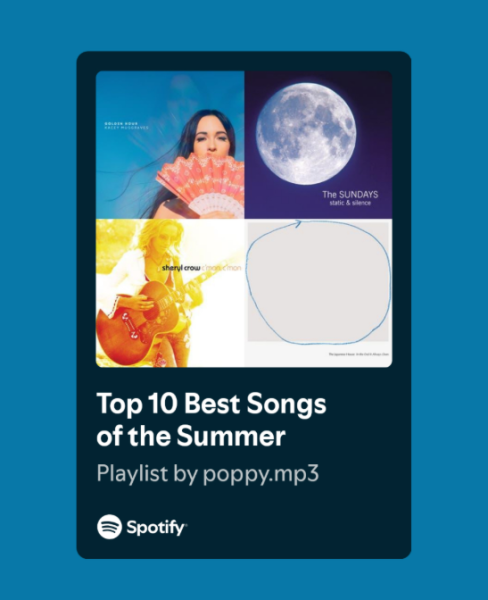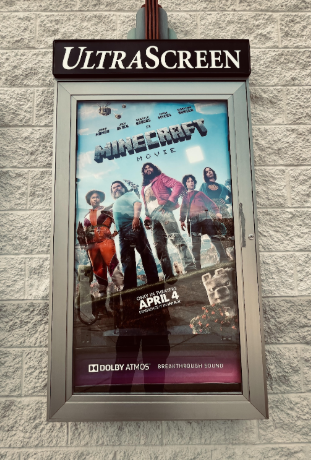The (Co-)Star of Astrology Apps

The Co-Star app icon, displaying a partially illuminated moon to create intrigue.
Astrology and its mystic promises are sweeping Americans off their feet across the country — and as we know, for every interest, there’s an app. Created in 2017, Co-Star is an app that provides its 5 million-plus users with their astrological charts, based on their exact time, date, and place of birth. With partially correct descriptions, half-hearted explanations, and daily horoscopes filled with a blend of nonsense and common sense, the app has gained a large and loyal following.
Classified as a pseudoscience, astrology is the study of celestial patterns, specifically that of the positions and movements of stars and planets, and their effect on human behavior. The most well-known form of astrology is the Western Zodiac, with 12 “sun signs” based on constellations and their corresponding months. Another popular aspect is a birth chart that predicts one’s future by analyzing their time and place of birth.
Co-Star does all of this, but less accurately. With semi-reliable charts criticized by professional astrologers, Co-Star makes an educated guess on different aspects of your life. It’s a modern take on the centuries-old art of astrology, targeted towards people who care, but not enough to make an effort to truly learn the practice.
That’s where Co-Star’s brilliance lies.
The app is, as some might say, the SparkNotes version of astrology.
The horoscopes make the app feel ever more personable, building a direct connection with the user, allegedly customized to their birth chart. Co-Star has redefined how its users interpret horoscopes. Once viewed as an ominous forecast of the future, the app has taken the bold step to dilute and condense these questionable fortunes even further. Indeed, the genius behind its guidance comes from its sheer lack of specificity and direction. Its vague stances make it easy for the words to resonate with the recipient. As one user’s horoscope said, “You know the truth behind what’s being said.”
Co-Star’s counsel includes “do” and “do not” sentiments that have been persuading the youth to make wise decisions such as “don’t commit identity theft,” and “do exhale.” Without Co-Star’s guiding hand, it’s quite possible these impressionable young adults may have done just the opposite.

Insightful advice telling users what to do and, alternatively, what not to do. (Co-Star App, Brooke Rhodes, Prerana Palety)
But where does the appeal come from?
Recently, interest in zodiac signs and astrology has resurfaced across the globe. This new trend has been attributed to a rise of identity crises sweeping the youth. With a need to feel ‘not like other girls,’ it can be hard to know which personality to adopt each day. This is where Co-Star thrives. Co-Star style astrology is great for those who wish to better understand themselves, or at least, wish to feel validated. “Co-Star is like weed, accessible, easy to use, and not too hardcore,” notes (Co-Star) user Heba Haq (junior). With daily suggestions on how to act, when to do work, and even who to socialize with, Co-Star flawlessly capitalizes on the insecurities and desperation

The profile of an added friend picturing an unknown, yet mysterious, woman.
of the American people.
Furthermore, the app’s interface is simplistic, minimalistic, and modern. When asked to describe her initial thoughts on the visuals, Haq described the app’s design as something “that just screams woke millennial,” with “a black-and-white color palette that invokes a keen sense of elitism.” Adding to this, the app’s ominous preassigned profile pictures
of random body parts paired with colorless, vintage drawings scattered about the app furthers this aura of mystique.
One of Co-Star’s most popular features is letting you add friends to check your compatibility through dubious planetary placement analysis and interpretation. After all, can you really call someone a friend if they don’t know your Mercury placement? Perhaps most importantly, these assessments don’t bother with how long you’ve known someone. A lifelong friend could be your astrological enemy; a passing acquaintance, the Charles to your Diana.
Despite knowing their users’ literal exact time of birth, one Co-Star feature offers a “sex and aggression” category to all, regardless of age. Although one might question the morality, and even legality of offering sex advice to minors, we see it as a bold move that the youth find empowering. The U.S Federal Government’s opinion is *currently* still unknown. Nevertheless, part of the app’s charm is its willingness to push the boundaries of what can and cannot be called advice.
Fortunately, Co-Star knows when to hit users with the hard truth. Co-Star encourages users to avoid their problems

Part of the daily horoscope is a focus on those the user can learn from and should avoid. Peaking time is also exhibited. (Co-Star App, Brooke Rhodes, Prerana Palety)
instead of facing them head-on. And by problems, we mean friends. Every day, there’s someone who simply does not match your astrological energy. Someone that must be cut out of your life, for precisely 24 hours.
At the bottom of your daily horoscope, Co-Star provides you with insight of those you should learn from and those you should avoid. Every day, two of your supposed friends are placed on the astrological chopping block of your affections. The explanation? Simple. “Avoid Earth Mercuries” or whichever sign the app developers deem the most intolerable. (A side note — one of the authors was, upsettingly, a Water Venus, which led to the delayment of this article).
Like all capitalist corporations, Co-Star’s main priority is the well-being of its users. As such, one particularly nifty feature is the “peak time”. The concept of peaking in high school is well known, but Co-Star has taken it a step forward, constantly innovating, like Steve Jobs with the iPhone or like AP Classrooms with torture. The app assigns new “peaks” everyday, in which one’s energy, motivation, and ability are at their highest. One day it may be at 12 pm while wasting away in an English Zoom class. Another may be at 5 am, while fully asleep. Nevertheless, it’s up to users to make the most of their golden hour. “Co-Star told me I would peak at 2 in the morning, so that’s when I took my math test,” recalls junior Varun Gupta, an avid Co-Star user. Despite reporting having heightened senses and newfound alertness, Gupta’s math grade has never been lower.
The notion that you define your future, as Co-Star has so convincingly proven, rings false. Whether it be honest to goodness astrology, or our interpretation of words that we so desperately wish to hear, Co-Star certainly is an app. Despite its potential shortcomings and debatable positives, the technology’s comforting assurances prove effective for many. In that sense, Co-star is a triumph.
Final Review: 3.5/5 Stars. Not enough tarot cards.








